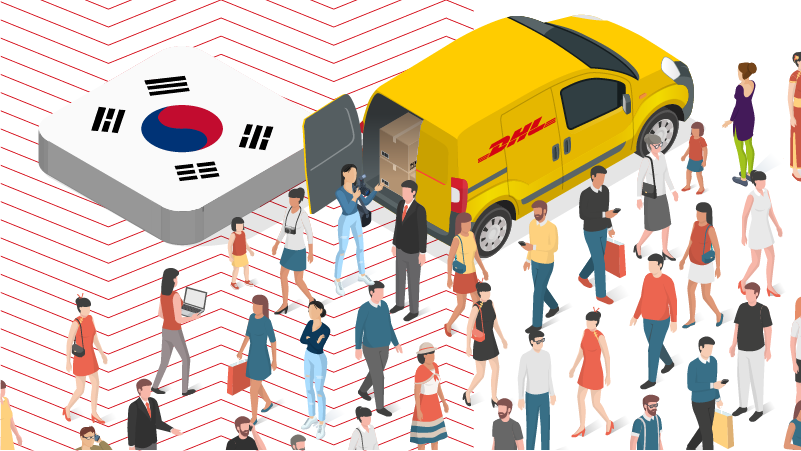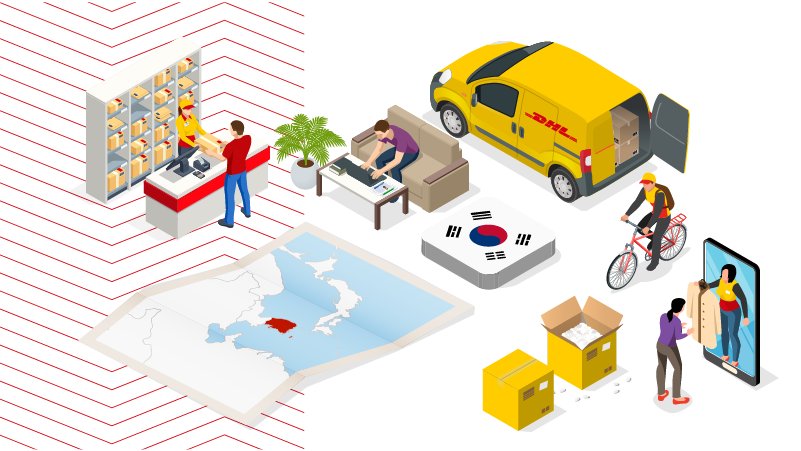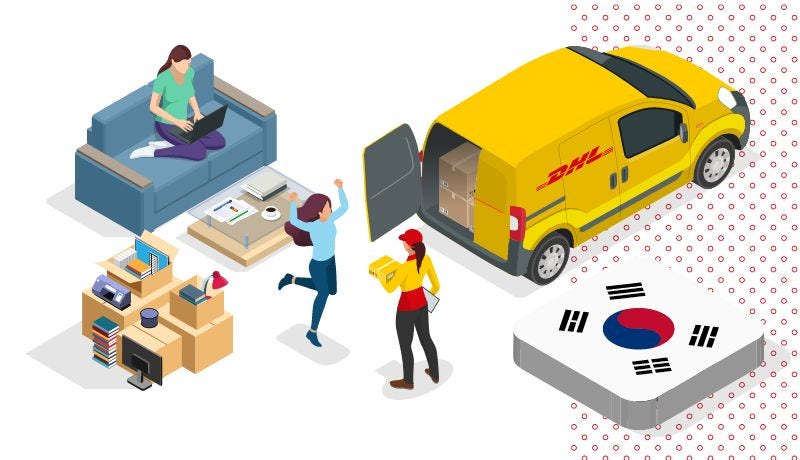Navigating the intricacies of international shipping can be daunting. However, shipping from Japan to South Korea doesn't have to be. With the right information and a reliable partner like DHL Express, you can ensure your goods reach their destination seamlessly. Whether you're an established e-commerce business expanding your reach or an individual sending a personal parcel, this guide will provide you with the essential steps and considerations for successful overseas shipping.
Understanding the South Korean market
South Korea has a thriving yet steadily growing e-commerce market, fueled by a tech-savvy population and widespread digital adoption. Let’s look at some key statistics that highlight its potential:

51.7 million people (As of 2023)

Internet usage: 93%¹

E-commerce share of retail sales: 18%²
- Forecasted e-commerce market growth: 2.7% CAGR from 2023 - 20283
- Forecasted number of e-commerce users: 45.3 million by 2028
- Largest demographic of e-commerce users: Aged 20 - 39
Most popular e-commerce markets in South Korea
As of October 2023, the leading online marketplaces in South Korea, based on monthly visits (in millions), are:
- Coupang: 127.6 million
- Naver: 67.5 million
- Gmarket: 40.1 million
- 11Street: 37.5 million
- ssg.com: 19.1 million
Consider setting up a store on these platforms if you are a business planning to sell to South Korean consumers.
Popular shopping holidays in South Korea
Shipping from Japan to South Korea: What you need to know
Shipping goods from Japan to South Korea involves navigating customs regulations, estimating shipping times, and selecting the right shipping services. Here’s how you can streamline this process, ensuring your shipments reach their destination promptly and securely.
Preparing your shipment: Documentation and packaging essentials
Accurate documentation is crucial for a smooth customs clearance process. In Japan, you'll need to prepare a commercial invoice with a detailed description of the goods, their value, and the Harmonized System (HS) codes. An export declaration may also be required. Before you ship to South Korea, double-check that you’ve included all the relevant information on your commercial invoice, including accurate product descriptions and HS codes and the receiver’s details, including their Entity Registration Number (this is mandatory for all businesses importing into South Korea).
Proper packaging is equally important to protect your goods during transit. Ensure your items are securely packed in sturdy boxes or containers with appropriate cushioning to prevent damage. South Korea has specific packaging regulations to adhere to for certain product categories.
For example, all food and beverage packaging materials made from recycled materials must undergo review and obtain certification from the Ministry of Food and Drug Safety (MFDS) before they can be used for business purposes. Failure to comply can lead to severe penalties, including imprisonment or hefty fines4.
Navigating customs clearance
Both Japan and South Korea have streamlined customs clearance procedures. Japan’s customs clearance procedure typically involves submitting the required documentation and paying any applicable export duties or taxes. When exporting from Japan to South Korea, it’s essential to prepare accurate documentation, including a commercial invoice with detailed descriptions, HS codes, and the recipient’s business registration number.
Meanwhile, the South Korean customs import clearance process includes assessing the goods, verifying the documentation, and collecting any import duties or taxes. The South Korean government has implemented several initiatives to simplify customs procedures and reduce processing times. The Regional Comprehensive Economic Partnership (RCEP) also eliminates or reduces tariffs on a wide range of goods, making trade between the two countries more efficient.
South Korea maintains strict import restrictions and quarantine requirements to protect its agricultural and ecological systems. Certain fruits, vegetables, and seeds may be prohibited or require specific import permits and phytosanitary certificates. Meat and poultry products may require health certificates and import licenses. Similarly, cosmetics and pharmaceuticals might be subject to ingredient restrictions and labelling requirements.
Always research and comply with the latest regulations, which can be found on the official websites of the Animal and Plant Quarantine Agency and the Ministry of Food and Drug Safety, to prevent delays or confiscation of your goods at customs.
If you need clarification on any specific requirements, consult a customs broker or seek guidance from DHL Express. They can help you clarify the regulations and prepare the necessary paperwork. Alternatively, you can check out some Customs Advice for First-time Shippers.
Choose DHL Express’ shipping solutions: Advantages and action steps
DHL Express offers a comprehensive shipping solution for Japan to South Korea shipments. Choose from time-definite express services for urgent deliveries.
With a robust global network and extensive experience in international shipping, DHL Express ensures your shipments are handled with utmost care and efficiency. Their advanced tracking system lets you monitor your package's progress in real-time, providing peace of mind throughout the journey.












